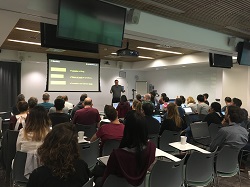As a Research Fellow in a dynamic and interdisciplinary research group, every day presents an opportunity to improve the way I communicate with my colleagues. It is a rare privilege to be surrounded by such a diverse and talented group of research and support staff, and I get a real sense of enjoyment from finding ways to connect across the disciplines. However, at 10 am on Monday the 18th of March, I was stood at the front of the Living Systems Institute seminar room A, looking out over 45 researches from across the university, and I was really struggling to think of something say.
A few months previously I received a Researcher Led Initiative Award (RLI) from the University of Exeter Researcher Development and Research Culture team. This award was made in response to an application that I had written to fund a workshop to introduce researchers to the increasingly important concept of version control. Version control systems such as “Git” provide frameworks for managing changes and updates to text based documents such as computer programs, manuscript or electronic lab books. Practicing version control can have a transformative effect on the efficiency of a research collaboration and is increasingly recognised as a key skill in many areas of academic and industrial research. I had experimented with version control using “Git” in some of my earlier work, but always suffered from nagging doubts that I fundamentally didn’t know what I was doing. Thus, the idea to host a workshop introducing the “Git ecosystem” was born! Fast-forward to a windswept Monday morning in March, I found myself trying to think of how to introduce the event that Charlie Kirkwood, another recipient of an RLI award, and I had been planning for the previous few months.
“Morning everyone, let’s ummm, let’s make a start”
Fortunately, the workshop quickly improved from here. Mr Jacob Tomlinson, Lead Engineer in the Met Office Informatics Lab opened the workshop with a fascinating and entertaining insight into the critical role that version control plays in managing the various software-based projects that are run by the MET office. Following Mr. Tomlinson’s 30 minute introduction, the rest of the workshop was delivered by Dr. Christopher Woods, group leader of the Research Software Engineering group at the University of Bristol. Dr. Woods, supported by Mr. Chris Edsall a research software engineer at the University of Bristol, provided a step-by-step practical introduction to the methodology and practice of version control using “Git”. Basic concepts (“Git status”, “Git add”, “Git commit -a”) were patiently introduced and then built upon over the course of the day. By the conclusion of the workshop, attendees had been shown how to create and manage online repositories for their own projects, as well as being taught “Git” programming from the command line and a graphical user interface. Anonymous feedback forms were hurriedly distributed to all attendees at the close of the event. 37 forms were completed and returned. The collated responses gave the workshop an average rating of 4.9/5.

Hosting the workshop was a great experience. Not only did I get to learn “Git” from the ground up, but I was forced to think about the logistics of event planning including: How to structure the schedule; how to advertise and recruit attendees; how to arrange the catering; how to brief the speakers; and much more. I’m sure that these lessons will help enormously in hosting future events, both big and small. Until this time, I will return my focus to developing and translating nonlinear microscopes into a clinical imaging tools. The broad remit of my research encompasses experimental development of novel instrumentation in the lab, and also writing image analysis software to quantify image features in real-time. Machine learning has a huge potential in the field of image analysis and it’s something that I’ve used on the odd occasion, but I wouldn’t profess to have a solid understanding of… I wonder when the next round of RLI awards are released?